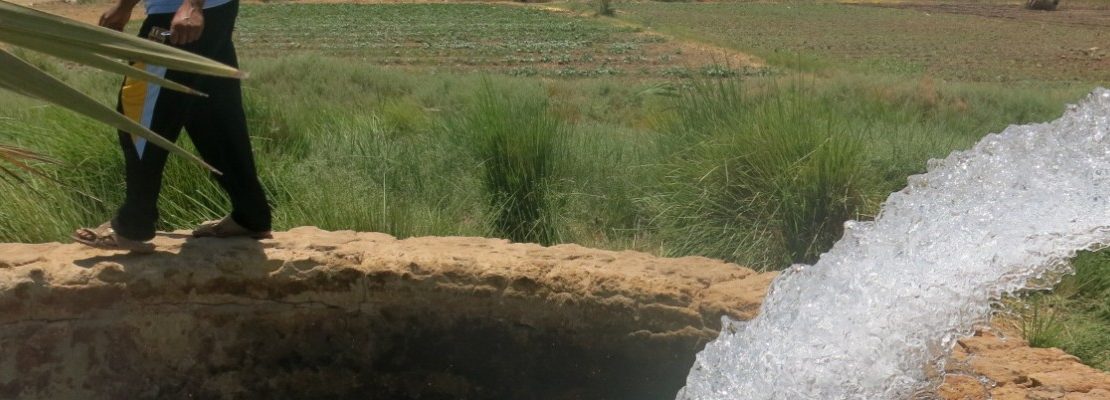Groundwater over-abstraction in the MENA region: 5 problems and some solutions
- July 14, 2017
- Posted by: administrator
- Category: Africa

In the Haouaria Plain of Northern Tunisia, a too familiar scene unfolds: a farmer stands near the edge of a wide hand-dug well, distraught. Groundwater levels continue to drop every year, increasing salinity and reducing the amount of crops that can be cultivated. Precipitation does not replenish the shallow aquifer like it used to. Groundwater depletion is a vexing phenomenon threatening sustainable economic and social development in the Middle East and North Africa (MENA). Controlling and managing over-abstraction has become a clear challenge for policy-makers, managers and academics in the region.

Can innovative policies and regulations be used to reverse the current trend of groundwater depletion? This complex problem requires a systematic far-reaching approach that builds on existing knowledge and practices within and beyond the region. Implemented by IWMI and national partners in Tunisia, Lebanon, Jordan, and the UAE, a three-year USAID-funded project studied the uses, limitations and potential of policy tools and stakeholder dialogue to curb groundwater over-abstraction. The project has found that the current regulation and management tools in the MENA region suffer from five “wicked” problems that prevent them from properly addressing groundwater issues.
1. Scattered web of groundwater users
The main problem affecting groundwater resources in the MENA region is the myriad and scattered number of groundwater users. Morocco like most other countries does not know how many wells there are to regulate. In Lebanon, official reports in the 1970s identified around 3,000 wells; now some estimates put the number between 80,000 and 100,000. Morocco, Algeria, Tunisia, Lebanon or Yemen all have between 100,000 and 200,000 wells. Regulating and enforcing policies is thus extremely arduous and resource intensive.
2. Lack of resources results in lax enforcement of rules and regulations
Legislation is toothless without the enforcement of rules. There is a pervasive presence of illegal drilling in Yemen and inventive Jordanian farmers tamper with or bypass groundwater meters, or hide illegal wells altogether. In Lebanon, more than half of the wells remain unregistered, only 300 major industrial and domestic wells are licensed, and most farmers dodge the required abstraction authorization. When coupled with the weak application of penalties, it’s no surprise that the Lebanese government suffers from poor recovery of well registration fees. Lack of resources and budget, serious understaffing in the ministries and departments in charge of monitoring groundwater resources, cause coordination and enforcement problems and a lack of accurate knowledge of what is happening on the ground.
3. Balancing short-term development with long-term environmental sustainability
This is an intrinsic policy dilemma facing all managers and decision-makers in the MENA region: ensuring livelihood security and poverty alleviation versus restricting well drilling and groundwater pumping to balance available resources and use. Unless new water is produced or provided (e.g. sea water desalination, wastewater reuse or surface water transfer), the trade-off between addressing short term socio-economic needs in the agricultural sector and long-term resource conservation is a political debate that generally favours the former. This is the case in Jordan, where the Azraq wetland lost 90% of its naturally flooded area between the 1970s and the mid-1990s due to agriculture expansion; and in Morocco, where overall annual groundwater overdraft exceeds 1 billion m3.
4. Vested interests and the politics of groundwater
Short-term political mandates and personal interests, whether financial or political, can hinder the neutrality of elected and appointed officials, undermining rule enforcement and state control. In Yemen, some members of parliament have drilled illegal wells. In Egypt, Jordan or Morocco, the interests of large-scale investors in groundwater-based agriculture have worked against the passing of constraining laws and enforcement of regulations.
5. Out of sight, out of mind
Groundwater resources and their depletion are invisible to most people, as changes are sometimes slow and the negative impacts are often delayed over years. After sudden rain events, infiltration of water may temporarily recharge aquifers and give the false impression of normality as groundwater levels seasonally increase. Coarse or limited technical knowledge about geological formations, groundwater storage and dynamics is a clear obstacle to more rational management.
So, what can we do?
Real solutions to these five problems will have to recognize and incorporate the challenges stated above. It is unreasonable to expect that groundwater users will register their wells if it is costly, burdensome, and ultimately not sanctioned. Some potential ways forward include:
knowing what you need to manage: much more emphasis and resources and investment on data, research and knowledge of groundwater resources and its uses and users. No management is possible without substantial investment by the state in data collection and analysis.
adapting tools and policies to the situation: licensing, pricing, co-management, etc. are only desirable and possible in particular contexts. Don’t jump in the bandwagon.
developing positive incentives to encourage registration of new and existing wells: make it administratively easy and cheap for users. Design positive incentives for registering wells and negative ones for not doing it.
breaking down large aquifers into manageable sub-units based on hydrologic, geologic, social and administrative considerations.
supporting stakeholder participation with funds and political commitments: stakeholder participation is not a panacea; it requires a long-term approach and a neutral facilitation if attempted.
Another way to work on these problems is to test innovations from other countries, both in the region and outside. The GRIPP (Groundwater Solutions Initiative for Policy and Practice) platform has been created explicitly to facilitate such exchanges. The partnership works with research and practice partners to scale up groundwater solutions for sustainable development and food and water security.
Perhaps more integrated approaches like GRIPP can help address the groundwater problems in the MENA region – but is it enough? What other innovations or solutions could be relevant to this situation?
